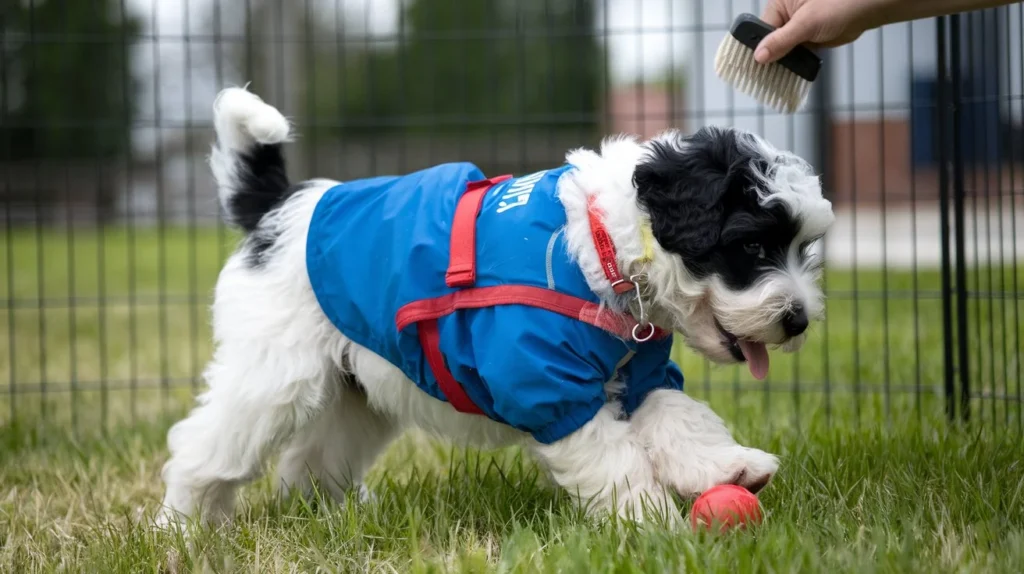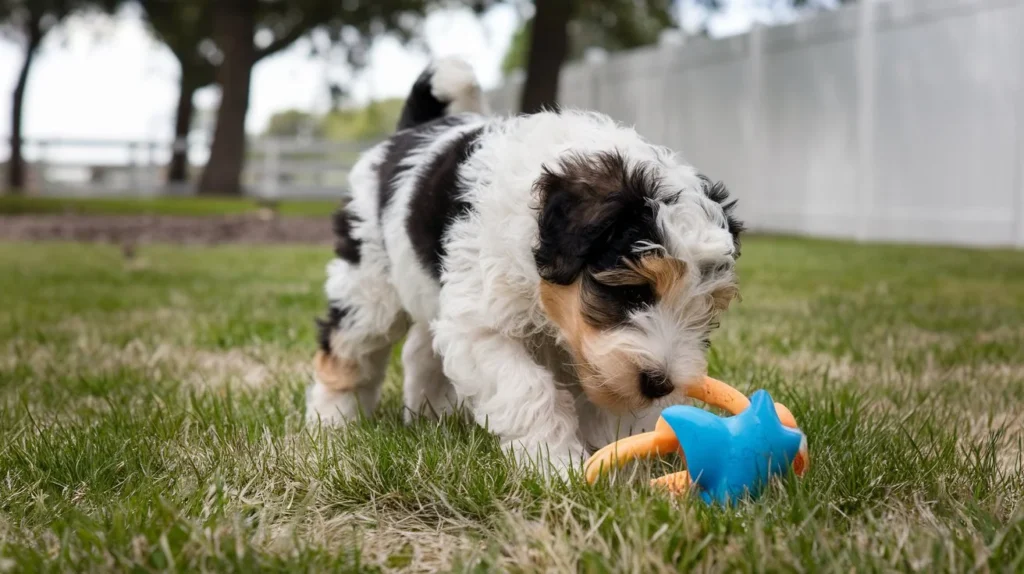Pyredoodle Puppy: When searching for the perfect family dog, many people are discovering the Pyredoodle – a thoughtful blend of the Great Pyrenees and Poodle breeds. This designer dog combines the Great Pyrenees’ protective nature with the Poodle’s intelligence, creating a unique companion that fits various lifestyles.
Understanding the Pyredoodle Breed
What is a Pyredoodle?
A Pyredoodle puppy is a mixed breed dog that results from crossing a Great Pyrenees with a Standard Poodle. These dogs are part of the growing “doodle” family, which includes various Poodle crossbreeds known for their intelligence and reduced shedding characteristics.
Breed History and Development
The Pyredoodle puppy is a relatively new addition to the designer dog world. While the exact origins aren’t well-documented, these dogs were likely first bred in the United States as part of the broader doodle movement that began with the Labradoodle in the 1980s.
Physical Characteristics
Pyredoodle puppy typically display these physical traits:
· Height: 15-32 inches
· Weight: 85-100 pounds
· Coat: Medium to long, wavy or curly
· Colors: White, cream, gray, or a mix
· Build: Strong and muscular
· Face: Expression combines Poodle alertness with Great Pyrenees gentleness

Pyredoodle Puppy: Personality and Temperament
General Disposition
Pyredoodle puppy inherit characteristics from both parent breeds:
· Intelligent and trainable (Poodle influence)
· Protective and loyal (Great Pyrenees influence)
· Patient with family members
· Generally good with other pets
· Calm and composed demeanor
Social Behavior
These dogs typically show:
· Strong bonds with family members
· Protective instincts toward their home
· Friendly nature with proper socialization
· Good adaptation to various social situations
Living with a Pyredoodle
Space Requirements
Pyredoodle puppy needs:
· Large living space
· Secured yard
· Room to stretch and exercise
· Access to outdoor areas
Exercise Needs
Daily exercise requirements include:
· 60-90 minutes of physical activity
· Mental stimulation through games
· Regular walks
· Playtime in secured areas

Temperature Tolerance
These dogs can handle various climates:
· Good cold weather tolerance (Great Pyrenees heritage)
· Moderate heat tolerance
· Need shade and water in warm weather
· Indoor access during extreme temperatures
Care Requirements
Grooming Needs
Regular maintenance includes:
· Brushing 2-3 times per week
· Professional grooming every 8-12 weeks
· Regular nail trimming
· Ear cleaning to prevent infections
· Dental hygiene maintenance
Dietary Requirements
A proper diet should include:
· High-quality protein sources
· Appropriate portion sizes for large breeds
· Age-appropriate formulations
· Fresh water available always
· Scheduled feeding times
Health Monitoring
Regular health checks should focus on the following:
· Joint health
· Skin conditions
· Ear infections
· Weight management
· Dental care
Also read: Comparing a Bernedoodle vs Pyredoodle: Best Doodle Guide 2024
Training Your Pyredoodle
Basic Training Approaches
Effective training methods include:
· Positive reinforcement
· Consistency in commands
· Early socialization
· Regular training sessions
· Patient approach

Advanced Training
Consider these training opportunities:
· Agility training
· Therapy dog certification
· Advanced Obedience
· Task-specific training
· Social training
Common Training Challenges
Be prepared for:
· Stubborn streaks
· Size management
· Protective instincts
· Energy control
· Socialization needs
Health Considerations
Common Health Issues
Watch for these conditions:
· Hip dysplasia
· Bloat
· Eye problems
· Skin allergies
· Joint issues
Preventive Care
Maintain health through:
· Regular vet check-ups
· Appropriate vaccinations
· Preventive medications
· Weight management
· Exercise regulation
Finding Your Pyredoodle
Choosing a Breeder
Look for breeders who:
· Provide health clearances
· Allow facility visits
· Share parent information
· Offer health guarantees
· Follow ethical breeding practices
Cost Considerations
Budget for:
· Initial purchase ($1,500-$3,000)
· Medical care
· Grooming expenses
· Training costs
· Supplies and equipment
Adoption Options
For pyredoodle puppy consider:
· Breed-specific rescues
· General dog rescues
· Adult dog adoption
· Foster-to-adopt programs
Frequently Asked Questions
Are Pyredoodles good family dogs?
Yes, Pyredoodles make excellent family dogs. They combine the Great Pyrenees’ gentle nature with the Poodle’s intelligence, creating a patient and protective family companion. However, their large size means supervision is needed with small children.
How much grooming do Pyredoodles need?
Pyredoodles require regular grooming maintenance. Plan for brushing 2-3 times weekly and professional grooming every 8-12 weeks. Their coat type can vary, but most need consistent attention to prevent matting and maintain healthy skin and fur.
What is the average lifespan of a Pyredoodle?
Pyredoodles typically live 10-12 years. This lifespan can be influenced by diet, exercise, genetics, and preventive healthcare. Regular veterinary care and a healthy lifestyle can help maximize their years with your family.
Conclusion
Pyredoodles offer a unique combination of intelligence, loyalty, and adaptability, making them excellent companions for the right families. While they require significant time investment in training, grooming, and exercise, their loving nature and protective instincts make them wonderful pets. Before bringing a Pyredoodle home, ensure you can provide the space, time, and resources these magnificent dogs need to thrive.
Remember these essential points:
· They need substantial living space
· Regular grooming is mandatory
· Early training and socialization are important
· They make devoted family companions
· Health monitoring is essential










